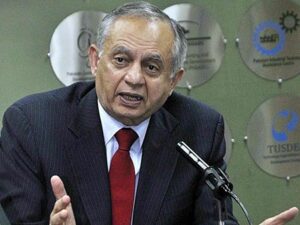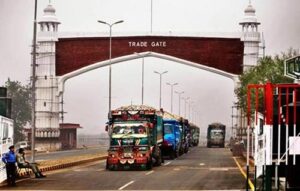Adviser to the Prime Minister Abdul Razak Dawood’s statement on opening trade with India stands in conflict with Imran Khan’s position that there won’t be any normal relations with New Delhi until it scraps its Aug. 5, 2019 legislation on occupied Kashmir
There is a tiny but highly influential lobby in Pakistan, which never misses an opportunity to advocate the resumption of trade ties with India even at the cost of the country’s core national interests, including undermining the Kashmir cause once for all. This lobby includes some business barons, select media tycoons, the so-called rights activists, especially those working for the Western-funded NGOs, and even several top leaders of mainstream political parties. The tentacles of this lobby are present even in the ruling Pakistan Tehreek-e-Insaf (PTI). On February 20 in Lahore, Adviser to the Prime Minister on Commerce Abdul Razak Dawood, in an interaction with the media, declared that “trade with India is the need of the hour.”
“As far as the ministry of commerce is concerned, its position is to trade with India. And my stance is that we should trade with India, and it should be opened now,” Dawood was quoted as saying by the English-language daily Dawn.
Ironically, the position of the Ministry of Commerce and Adviser Commerce stands directly in conflict with Prime Minister Imran Khan’s declared policy that there won’t be business as usual with India until New Delhi revokes its August 5, 2019 measures, which violate U.N. resolutions on Kashmir and bilateral agreements between the two countries.

New Delhi unilaterally scrapped the symbolic autonomous status of the occupied Kashmir in August 2019 and made it part of its ‘union territory.’ Since then, India has launched concerted efforts to change the demographics of this Muslim-majority region and carried out the worst kind of human rights abuses and state terrorism.
Against this backdrop, downgrading diplomatic and trade relations with India was the bare-minimum Islamabad could have done, along with offering some lip-service to the cause. Under these circumstances, Prime Minister Imran Khan’s stance of “no talks and no trade with India” not just reflects the sentiment of the vast majority of Pakistanis but was necessary to keep the issue alive.
Yet, Dawood — who himself is a leading businessman — challenged Prime Minister Imran Khan’s principled position on Kashmir and openly signalled to the enemy that there are fissures within the government ranks over the issue, implying that sooner or later Pakistan would practically accept the one-sided assimilation of Kashmir into the Indian union territory. From Pakistan’s point of view, Abdul Razak Dawood’s statement is highly irresponsible and dangerous. It encourages New Delhi to continue with its policy of repression in the occupied Himalayan region without any cost.

And this is not the first time that this adviser to the Prime Minister has tried to damage Pakistan’s interest through his words and actions. In September 2018, soon after the PTI government came to power, The Financial Times quoted Dawood saying that Pakistan was mulling over a review of the CPEC agreement with China. The report had said that Dawood believed that all CPEC-related projects must be halted for a year. Dawood’s statement created an uproar even within the government circles, and he was forced to issue a rebuttal. But Dawood’s negative remarks against the CPEC were nothing short of an attempt to wreck relations between the two time-tested allies.
Again in March 2021, the then Finance Minister Hammad Azhar had announced that the Economic Coordination Committee had allowed the import of cotton and sugar from India. Mercifully, the proposal was shot down in the cabinet. It was later revealed that Razak Dawood misled young Azhar about the issue, saying that he had a nod from the prime minister.
One can say that there is a method to Abdul Razak Dawood’s madness as he knows that he is representing the deep-rooted commercial, business and political interests of the influential lobby, which has been long trying to transform Pakistan into a state ready to accept Indian hegemony in the region by compromising on its national interests — from Kashmir to the country’s nuclear programme.
No wonder, a few days before this highly controversial statement made by Razak, another leading businessman, Mian Muhammad Mansha, also advocated opening trade with India.
One can see that the members of the lobby are acting in tandem. It is only the public pressure that is preventing this lobby from launching an all-out pro-India advocacy campaign. However, they are testing waters for now by issuing such statements. Unfortunately, their test balloons are largely being ignored by most media outlets, which are focused on domestic politics. But this indifference of the media, political leadership and even the state institutions towards the activities of this lobby is a dangerous sign and further damaging the Kashmir cause for which Islamabad has failed to take any practical or meaningful steps.
Prime Minister Imran Khan and his team — no matter how overwhelmed they are because of the challenges and compulsions of domestic politics — need to take stock of the situation and act against dissenters in the PTI ranks, who are challenging the government policy and deliberately trying to damage the Kashmir cause.
The government and the state institutions should be transparent that the country’s long-term core interest cannot be compromised because of today’s weaknesses. Pakistan has to stand by Kashmir at any cost — come what may. The Razak Dawoods and Mian Manshas of this world, their patrons and allies in the media, cannot be allowed to damage the country for their narrow self-serving interests.
Abdul Razak Dawood’s statement should be condemned — more so because it has come when the Hindu extremist government is aggressively squeezing space for Muslims in occupied Kashmir and those living in India. From the occupied Kashmir to every Indian state and city, Muslims face discrimination at every level — from educational institutions to the employment market. They are being hounded, humiliated, tortured and even killed on the flimsiest charges, from slaughtering a cow — which is considered sacred by many practicing Hindus — to marrying a Hindu woman. The latest controversy surrounding the wearing of the Hijab is taking the hostilities against Muslims to the next level.

Prime Minister Imran Khan needs to issue a strong message on Kashmir, assuring the Kashmiris and Pakistanis that there has been no one-sided concession or flexibility, which was the hallmark of the former government of Nawaz Sharif. In the future, the Prime Minister should also take action against those cabinet members who do not share the nation’s aspirations and his vision on Kashmir. Let’s hope that Prime Minister Imran Khan does not let the nation down on this front and continue to expose Indian fascism and advocate the Kashmir cause at every possible level. If Pakistan is sincere in winning international support on this issue, it must walk the talk. New Delhi must first revoke its Aug. 5, 2019 legislation on occupied Kashmir to restore regular ties.



